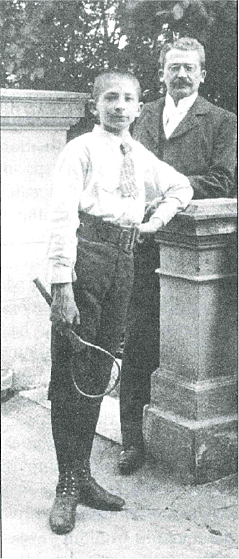Ludwig Heinrich Edler von Mises (September 29, 1881)
by Peter Mentzel

Our featured author for the month of September is the Austrian economist and social scientist Ludwig von Mises. He was born into a distinguished Jewish family in the city of Lemberg (now the Ukrainian city of Lviv) in the Kingdom of Galicia, then in the Austrian half of Austria-Hungary. Around 1887 his family moved to Vienna, and he began his formal education, culminating in 1906 when he received his Doctorate in Law from the University of Vienna. Late in 1903 he read Carl Menger's Grundsätze der Volkswirtschaftslehre (Principles of Economics), a book which he said "made an economist out of him" and set him on the course of his career as one of the best known and influential members of the Austrian School of Economics. A few years later, in 1912, he published his first book (English title: A Theory of Money and Credit) after which he was appointed a Privatdozent at the University of Vienna. It was an unpaid position, but it nevertheless gave him the opportunity to teach classes and run seminars. In the meantime, to pay the bills, he had gone to work at the Austrian Chamber of Commerce, a job he held until 1934.
His intellectual and academic pursuits were cut short by the outbreak of World War I, during which he served as an artillery officer and saw action in Galicia, the Carpathians, and northern Italy. Returning to Vienna in 1917, he was soon pulled into the political and economic chaos of the disintegration of Austria-Hungary. Through his various advisory positions, he helped the new republic avoid a communist revolution in 1918 and the threat of hyperinflation in the early 1920s.
In the midst of this public work, in 1919 he published Nation, Staat, und Wirtschaft,(translated as Nation, State, and Economy) in which he argued that the only path for European recovery from the catastrophe of the war was the liberal agenda of free trade, open borders, and peace--none of which, he lamented, looked very likely at the time. In 1922 he followed up this call for classical liberal economic policies with Socialism, which became one of his best known and admired books. In it, he lays out a sophisticated argument that implementing a socialist socio-economic system would be not only dangerous, but ultimately impossible.
Mises remained unable to secure a paying academic position until 1934 when he was offered a job of Visiting Professor at the Graduate Institute of International Studies in Geneva. Given the rise of National Socialism in both Germany and Austria, this could not have come at a better time, and he accepted immediately. Despite the increasingly tense international scene, Mises' years in Geneva were generally happy ones, the personal highlight of which was his marriage (after a 12 year engagement!) to a former actress, Margit Sereny-Herzfeld in 1938. But the newly-married couple faced an increasingly dangerous international environment, highlighted by the German annexation of Austria in that same year (following which, the Gestapo plundered Mises' papers still in Vienna). Ludwig and Margit finally emigrated from Geneva to the USA in 1940, in a harrowing month-long trip via France, Spain and Portugal. They settled in New York City, where their situation was financially and academically precarious. Thanks to a grant from the Rockefeller Foundation, Mises found some support from the National Bureau of Economic Research. Then in 1945 he was appointed a visiting professor at New York University's Graduate School of Business Administration. Though his classical liberal approach to economics and the social sciences had fallen largely out of fashion with the economics profession, he continued to hold seminars, and joined the newly established Foundation for Economic Education in 1946, the same year that he became a US citizen. He also continued to publish, notably producing what is arguably his crowning achievement, Human Action, in 1949. He was finally recognized for his lifetime of work with an award from the American Economic Association in 1969, including the title of Distinguished Fellow. He died on October 10, 1973.
Find the Liberty Fund collection of Mises's works available for purchase here.